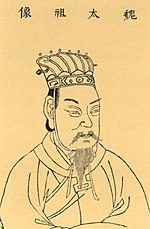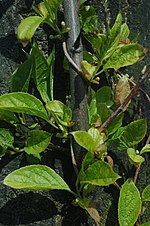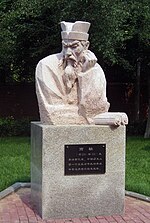Wu wei (simplified Chinese: 无为; traditional Chinese: 無為; pinyin: wúwéi) is an ancient Chinese concept literally meaning "inexertion", "inaction", or "effortless... 44 KB (5,872 words) - 03:41, 11 May 2024 |
Wu Wei may refer to: Wu wei, an important tenet of Taoism that involves knowing when to act and when not to act Wu Wei (actress), Hong Kong actress Wu... 864 bytes (145 words) - 11:55, 26 September 2021 |
 | quotations related to Wei Wu Wei. The 'Wei Wu Wei' Archives "The Spirit Works : Wei Wu Wei Biography" by Gregory Tucker Wei Wu Wei Book Excerpts Articles... 9 KB (958 words) - 08:17, 29 April 2024 |
 | established the state of Cao Wei. Sun Quan agreed to submit to Wei and was granted the title of a vassal king, "King of Wu" (吳王), by Cao Pi. A year later... 39 KB (3,491 words) - 00:52, 12 May 2024 |
Shen Buhai (section Wu wei) forebear, Creel believed that Shen Buhai's correlation between an inactive (Wu-wei) ruler, and a handling of claims and titles likely informed the Daoist conception... 40 KB (5,799 words) - 03:52, 17 April 2024 |
 | Wei (Hanzi: 魏; pinyin: Wèi < Middle Chinese: *ŋjweiC < Eastern Han Chinese: *ŋuiC) (220–266), known as Cao Wei (曹魏) or Former Wei in historiography, was... 29 KB (2,853 words) - 00:41, 12 May 2024 |
 | regard to virtue, it has otherwise prior been argued that he considers wu-wei, or nonaction, it's essence, as an otherwise predominant focus for him.... 45 KB (5,902 words) - 12:44, 13 April 2024 |
 | sharpen the point. Wu wei, literally 'non-action' or 'not acting', is a central concept of the Tao Te Ching. The concept of wu wei is multifaceted, and... 40 KB (4,374 words) - 04:48, 14 May 2024 |
 | emperor of the state of Cao Wei, to abdicate to him. He reigned from 266 to 290, and after conquering the state of Eastern Wu in 280, was the emperor of... 25 KB (3,312 words) - 03:44, 15 April 2024 |
 | Cao Cao (redirect from Emperor Wu of Wei China) [Cao Cao's Apologia], Wei Wu gu shi 魏武故事 [The Memoirs of Lord Wu of Wei], 但食武平萬戶 Cited in Chen and Pei 429, 1.32–34 n. 1. Book of Wei:... 187 KB (28,145 words) - 00:02, 13 May 2024 |
 | Jiao and Empress Wei Zifu were the only two empresses during Emperor Wu's reign. Emperor Wu did not make anyone empress after Empress Wei Zifu committed... 83 KB (11,613 words) - 14:35, 26 April 2024 |
 | Three Kingdoms (section Wei) The Three Kingdoms of Cao Wei, Shu Han, and Eastern Wu dominated China from 220 to 280 AD following the end of the Han dynasty. This period was preceded... 73 KB (10,030 words) - 19:54, 19 April 2024 |
kin of Emperor Wu of Han as the younger half-brother of Emperor Wu's wife Empress Wei Zifu, and later the third husband of Emperor Wu's older sister Eldest... 21 KB (2,998 words) - 11:53, 9 April 2024 |
and laissez-passer, laissez-faire being a translation of the Chinese term wu wei (無為). Gournay ardently supported the removal of restrictions on trade and... 89 KB (10,482 words) - 01:48, 10 May 2024 |
 | Schisandra chinensis (redirect from Wu wei zi) mainly planted in China is "Hong-zhen-zhu". This cultivar is next to "Bai Wu-wei-zi", "Chang-bai-hong", and "Da-chuan-hong" one of the main cultivars in... 23 KB (2,619 words) - 16:50, 17 October 2023 |
posthumously known as Empress Si of the Filial Wu (Chinese: 孝武思皇后; pinyin: Xiàowǔ Sī Huánghòu) or Wei Si Hou (衛思后, "Wei the Thoughtful Empress"), was an empress... 25 KB (3,812 words) - 14:25, 21 April 2024 |
 | to administrative methods (fa). Hiding his power and wit, Shen Buhai's Wu wei (generally typified as "effortless action") teaches the ruler not to engage... 64 KB (8,924 words) - 16:51, 15 May 2024 |
 | Tao Te Ching (redirect from Wu-ch'ien wen) sharpen the point. Wu wei, literally 'non-action' or 'not acting', is a central concept of the Tao Te Ching. The concept of wu wei is multifaceted, and... 35 KB (3,800 words) - 18:47, 21 April 2024 |
Wu Wei (simplified Chinese: 武卫; traditional Chinese: 武衛; pinyin: Wǔ Wèi), also known by her English name Maggie Wu, is a Chinese business executive who... 3 KB (245 words) - 23:30, 9 April 2023 |
Wei Wei may refer to: Wei Wei (male writer) (1920–2008), Chinese writer Wei Wei (actress) (1922–2023), Chinese actress Wei Wei (singer) (born 1963), Chinese... 615 bytes (115 words) - 13:03, 2 November 2023 |
equanimity, and thus the appropriate reaction. He reacts with wu wei (Chinese: 無爲; pinyin: wú wéi; i.e. 'not intervening', 'not acting') but this term should... 15 KB (1,514 words) - 18:57, 7 May 2024 |
between wu (void or emptiness, in the sense of wuji) and the natural, dynamic balance between opposites, leading to its central principle of wu wei (inaction... 49 KB (6,228 words) - 08:33, 14 May 2024 |
Interview with SMZB Frontman Wu Wei". Under the Wall. Retrieved 2023-05-13. The Guardian interviews Wu Wei An Interview with Wu Wei (2014) SMZB on their new... 2 KB (135 words) - 23:15, 27 November 2023 |
 | Wu, Wei (15 December 2014). 赵紫阳与邓小平的两条政改路线. New York Times (in Chinese). Archived from the original on 21 October 2019. Retrieved 3 May 2020. Wu, Wei... 235 KB (25,229 words) - 02:58, 7 May 2024 |






